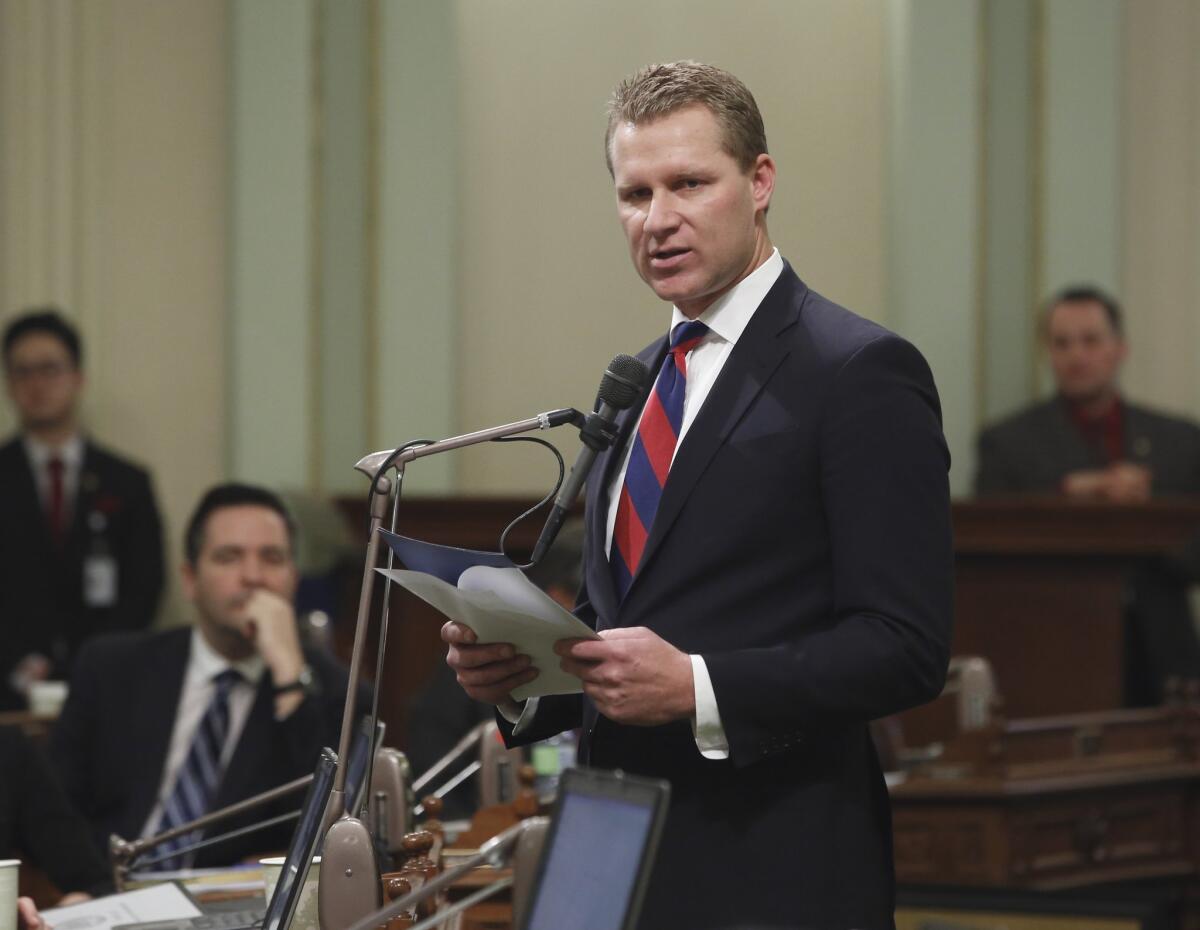How Assemblyman Chad Mayes made me believe politics can still be a noble profession

- Share via
Assemblyman Chad Mayes of Yucca Valley represents the Marines in Twentynine Palms, the crystal-gazers in Joshua Tree, the rainbow-flaggers in Palm Springs, the monied elite of Indian Wells and other desert dwellers like me. Mayes is fairly conservative. I’m fairly progressive. We have about as much in common as Chihuahuas and chalupas.
Or so I thought.
Like a lot of people, we’re both tired of the intractable polarization that too many pols call “standing on principle.” Like a lot of people, we find it sad, and dangerous to democracy. Mayes is among a select number of Republicans who won’t tolerate fake statesmanship.
California and the nation could use more elected officials like Chad Mayes, whatever their party affiliation.
In December, Mayes changed his party affiliation from Republican to “no party preference.” He represents an electorate almost equally split between registered Democrats and Republicans, but that’s not why he left the party. It left him.
In 2017, as Republican Assembly leader, he voted with then-Gov. Jerry Brown and the Democrats to extend the state’s cap-and-trade program, a regulatory effort to address climate change. Mayes was one of only seven Assembly Republicans to support the measure, and it did not endear him to his GOP colleagues — he stepped down from the leadership position a month later.
Hardly a tree-hugger, Mayes wasn’t in love with cap-and-trade, but he was willing to compromise. As he told the Hi-Desert Star at the time, “I’m not sure if that would work, but if it is true, you have to think about the moral side of that. To think people are going to be suffering so you can win elections? That’s not right to me.”
In 2018, he joined former Gov. Arnold Schwarzenegger as a proponent of the centrist advocacy group New Way California, which bills itself as “a movement that seeks to put people above political parties to improve the lives of all Californians.”
In July, when Trump told a couple of urban Democratic congressional representatives to “go back and help fix the totally broken and crime-infested places from which they came,” Mayes called him out, tweeting, “Dear Fellow Republicans, we must speak out and return ourselves to decency. This cannot be who we are!”
In announcing his recent divorce from the GOP, Mayes said he “cares more about governing and making decisions to make people’s lives better than I do about furthering the party. As an elected official, your job isn’t representing parties, it’s representing people.”
There’s a reason I believe him. It’s personal.
In January 2017, I requested a printed directory from Blue Shield of the medical providers in my new preferred provider organization. By law, insurers must send the directory within five business days of receiving a request. By the end of April, after multiple calls and letters, I was still waiting.
I wrote to my representatives in the state Assembly and Senate and in the U.S. Congress to let them know that Blue Shield hadn’t lived up to its obligation, and to vent about the shameful commoditization of health in this country. As a knee-jerk cynic, I expected no one to respond.
Less than a week later, I received the only response that indicated someone had listened. It was from Mayes. He advised me to contact a specific person in his office if I wanted to open an official inquiry with the appropriate state agencies. He provided the staffer’s email and phone number.
Next year, I will vote to re-elect Mayes as my Assembly representative.
My vote won’t be for someone to represent my legislative priorities — it will acknowledge someone who deserves my support for doing his job without partisan consideration. My vote will support what can be the noble profession of politics. I will vote for leadership.
It’s what we need.
Ellen Alperstein is a freelance writer and editor, and a former editor for the Los Angeles Times-Washington Post News Service.
More to Read
A cure for the common opinion
Get thought-provoking perspectives with our weekly newsletter.
You may occasionally receive promotional content from the Los Angeles Times.










